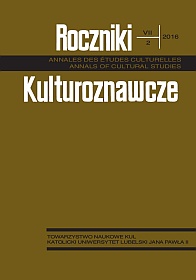In Search of Female Spiritual Agency
Abstract
In the paper, I explore the issue of female spiritual agency through ethnographic fieldwork conducted among Polish converts from Catholicism to a female dominated, Hindu rooted new religious movement, the Brahma Kumaris. My data show that reasons of conversion include dissatisfaction of gender relations. However, instead of becoming feminists, the women at the center of my research commit to strict ascetic discipline. The changes that this commitment entails totally reorganize their relations within their families and their social lives. Drawing on contemporary developments in anthropological approaches to agency, I focus on theorizing those elements of agency and identity that go beyond liberal feminist concepts of women’s emancipation. The Brahma Kumaris is a marginal group, but the general pattern of analysis of renegotiation of family life and relations beyond the private sphere may apply to other women’s groups.
References
Adamiak Elżbieta: Milcząca obecność. O roli kobiety w Kościele. Warszawa: Biblioteka „Więzi” 1999.
Asad Talal: Formations of the Secular. Christianity, Islam, Modernity. Stanford: Stanford University Press 2003
Babb Lawrence: Indigenous feminism in a modern Hindu sect. „Signs: Journal of Women in Culture and Society” 9:1984 nr 3 s. 399-416.
Babb Lawrence: Redemptive Encounters. Three Modern Styles in the Hindu Tradition. Berkley: University of California Press 1986.
Bierca Marta: Mistyka typu ludowego. Kobieca pobożność maryjna w świetle teologii feministycznej. W: Kobiety i religie. Red. Katarzyna Leszczyńska, Agnieszka Kościańska. Kraków: Zakład Wydawniczy „Nomos” 2006.
Casanova José: Polska katolicka w postchrześcijańskiej Europie. Przeł. Tomasz Wiścicki. „Więź” 2004 nr 5 s. 51-64.
Doktór Tadeusz: Ruchy kultowe. Psychosocjologiczna charakterystyka uczestników. Kraków: Zakład Wydawniczy „Nomos” 1991.
Eduards Maud L.: Women’s agency and collective action. „Women’s Studies Forum” 1994 s. 2-3.
Fernandes Leela: Transforming Feminist Practice. Non-Violence: Social Justice and the Possibilities of a Spiritualized Feminism. San Francisco: Aunt Lute Books 2003
Howell Julia Day, Nelson Peter L.: The Brahma Kumaris in the Western world, part II: demographic change and secularization in an Asian new religious movement. „Research in the Social Scientific Study of Religion” 2000 s. 225-239
Klassen Pamela E.: Sacred Maternities and Postbiomedical Bodies: Religion and Nature in Contemporary Home Birth. „Signs. Journal of Women in Culture and Society” 26:2001 nr 3 s. 775-809.
Kościańska Agnieszka: Brahma Kumaris: między celibatem a macierzyństwem. W: Kobiety i religie. Red. Katarzyna Leszczyńska, Agnieszka Kościańska. Kraków: Zakład Wydawniczy „Nomos” 2006.
Kościańska Agnieszka: Działanie ciszą. „(op.cit.) Maszyna Interpretacyjna. Pismo Kulturalno- Społeczne” 2007 nr 3 s. 3-5
Kościańska Agnieszka: Legion of Small Knights: Informal Movement within the Polish Roman Catholic Church. W: Religious Innovations in a Global Age. Essays on of the Construction of Spirituality. Ed. George N. Lundskow. Jefferson, NC: McFarland 2005 s. 160-175.
Kościańska Agnieszka: On celibate marriage: conversion to the Brahma Kumaris in Poland. W: On the Margins of Religion. Ed. Frances Pine, João de Pina-Cabral. New York–Oxford: Berghahn 2008.
Kościańska Agnieszka: Potęga ciszy. Konwersja a rekonstrukcja porządku płci na przykładzie nowego ruchu religijnego Brahma Kumaris. Warszawa: Wydawnictwa Uniwersytetu Warszawskiego 2009.
Leszczyńska Katarzyna: Świeccy mężczyźni i kobiety w instytucji Kościoła rzymskokatolickiego w Polsce. Segregacja wertykalna i horyzontalna w kościelnych organizacjach administracyjnych. „Studia Socjologiczne” 2014 nr 1 (212).
Mack Phyllis: Religion, feminism, and the problem of agency. Reflections on eighteen-century Quakerism. „Signs. Journal of Women in Culture and Society” 2003 nr 1 s. 149-177.
Mahmood Saba: Feminist theory, embodiment, and the docile agent: Some reflections on the Egyptian Islamic Revival. „Cultural Anthropology” 2001 nr 2 s. 202-236.
Messer-Davidow Ellen: Acting otherwise. W: Provoking Agents: Gender and Agency in Theory and Practice. Ed. Judith Kegan Gardine. Urbana: University of Illinois Press 1995.
Offen Karen: Defining Feminism: A Comparative Historical Approach. „Signs” 1988 nr 1 s. 119-157.
Palmer Susan: Women’s “Cocoon Work” in New Religious Movements: Sexual Experimentations and Feminine Rites of Passage. „Journal for the Scientific Study of Religion” 1993 nr 4 s. 343-355.
Rommelspacher Birgit: Right-wing ‘feminism’ a challenge to feminism as an emancipatory movement. W: Women, Citizenship and Different. Ed. Nira Yuval-Davis, Pnina Werbner. London–New York: Zed Books 1999.
Skultans Vieda: The Brahma Kumaris and the role of women. W: Women as Teachers and Disciples in Traditional and New Religions. Ed. Elizabeth Puttick, Peter B Clarke. Lewiston– Queenston–Lampeter: Edwin Mellen Press 1993.
Walliss John: The Brahma Kumaris as a ‘Reflexive Tradition’: Responding to Late Modernity, Aldershot–Hants–Burlington, VT: Ashgate 2002.
Werbner Pnina: Upolitycznione macierzyństwo i feminizacja obywatelstwa: ruchy kobiece i transformacja sfery publicznej. Przeł. Katarzyna Stańczak-Wiślicz. W: Gender. Perspektywa antropologiczna. T. 1: Organizacja społeczna. Red. Renata E. Hryciuk, Agnieszka Kościańska. Warszawa: Wydawnictwa Uniwersytetu Warszawskiego 2007
Zimniak-Hałajko Marta: Raj oswojony. Antropologia nowych ruchów religijnych. Gdańsk: słowo/obraz terytoria 2003.





